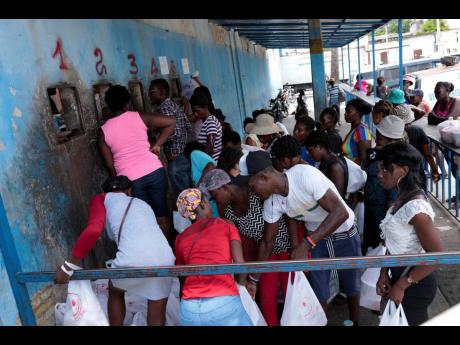Haitians dying of thirst, starvation in severely overcrowded jails
PORT-AU-PRINCE (AP):
The emaciated inmate in black shorts lay on a thin mat in Haiti’s most notorious prison, isolated from other prisoners at Port-au-Prince’s National Penitentiary because of drug-resistant tuberculosis.
He slowly sat up to talk to a visiting reporter and more than 70 fellow tuberculosis patients gathered at the door of the neighbouring cell to complain about their suffering while detained, many on minor charges like theft.
“We don’t have water!” one cried, while his fellow inmates said their food came late or not at all.
Haitian inmates are thirsty, starving and sleeping standing up because they don’t have enough room to lie down. The United Nations says 185 inmates died in Haiti last year – many of malnutrition-related diseases. This year, more than 20 have died so far. Human rights experts and attorneys expect the number to rise because gang violence has led to severe fuel and food shortages.
“I fear that a humanitarian catastrophe is coming,” said attorney Arnel Rémy, coordinator for Haiti’s Association of Lawyers for the Defence of Human Rights.
More than 80 per cent of Haiti’s more than 11,400 inmates are being held in pre-trial detention. It could be years before they see a judge, if at all, according to human rights experts. Haitian law allows people to be held legally without charge for 48 hours but in Haiti, the law often isn’t followed.
Last year, Haiti’s government released more than 70 inmates convicted of minor offences after several videos posted on social media showed emaciated prisoners. But such moves are rare and in the meantime, the health of inmates worsens, with some dying before they get to court.
STUDY FINDINGS
In December, the University of Florida published a study that found that men in Haiti’s prisons were on a starvation-level diet, consuming fewer than 500 calories a day. Researchers studied more than 1,000 inmates at two prisons in Haiti, including the National Penitentiary. They also found that more than 75 per cent were at risk for scurvy and beriberi – a lack of B1 vitamin – and noted that prisoners are not fed during lockdowns.
Some prisoners have friends or family who bring them food and drink every day, but that long-standing practice has dwindled amid a surge in gang violence that has shut down key roads and led to a scarcity of public transportation in some communities.
“No one brings me food,” said François Gausly, 50, adding that he has been in prison for four years after being accused of stealing a motorcycle, but has yet to see a judge. “I eat only once a day. Sometimes it’s rice. Sometimes it’s grits.”
A US State Department report noted that arbitrary arrests are common in Haiti and that authorities often detain people on unspecified charges.
The area around Haiti’s National Penitentiary – the country’s biggest with nearly 4,000 inmates, even though it was built for 800 – has grown more dangerous: Gunshots from warring gangs ring out almost daily, and a correctional officer was shot in late May as he left the penitentiary.
Despite the risk, about a dozen women stood outside the prison on a recent weekday holding plastic bags of food scrawled with the names of their loved ones and their prison cell number.
One woman who brought rice scooped some of it up with her hand and ate it as a corrections officer observed her: Anyone bringing food or drink is forced to taste it to avoid attempts to poison someone inside.

